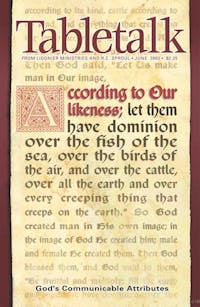
Request your free, three-month trial to Tabletalk magazine. You’ll receive the print issue monthly and gain immediate digital access to decades of archives. This trial is risk-free. No credit card required.
Try Tabletalk NowAlready receive Tabletalk magazine every month?
Verify your email address to gain unlimited access.
There are few theological controversies more crucial than that which rages over the question of the nature of humanity. In our age, we face a real threat of the “abolition of man.”
Modern thinkers have an overwhelming desire to wrench our understanding of ourselves out of any connection with the God of the Bible. But anthropology is married to theology. Take God out of the equation, and the question of the nature of man (anthropos) is left to stand or fall on its own. When God is driven into exile or vanquished altogether, people follow suit, for we are made in God’s image. The image-bearer loses his significance the moment the One whose image he bears is eclipsed.
Thus, the message every young person gets today in the name of science and advanced education is that he or she is a cosmic accident, a grown-up germ that has emerged fortuitously from the slime, garbed temporarily in the guise of intelligence and intentionality (which are really myths that obscure the truth of sheer physical causes). This intelligent animal (homo sapiens) is said to share the destiny of the snail and the octopus, the abyss of nothingness.
Thus, man is reduced to a brute of insignificant origin. And modern culture has embraced this animalistic view of human beings in the arenas of science, law, public education, the arts, and business.
The humanist declares that people still have dignity, but it is a declaration without substance. Cosmic accidents don’t have a lot of dignity in the grand scheme of things. For a creature who lives between the poles of an origin of insignificance and a destiny of insignificance, it seems ludicrous to imagine any dignity. If Christianity embraces faith, humanism embraces credulity, as it has a view of humanity that at best is Pollyanna-like. Better the existentialism of Sartre, who at least had the courage to take humanism to its logical conclusion and say man is a “useless passion.”
While there is great rancor today over such issues as gender equity and sexual orientation, the deeper question is voiced by the cynic, who asks simply, “Who cares?” What difference does it make whether males exploit females or whether the beast is heterosexual or homosexual in its orientation? We don’t get excited about the sexual proclivities of worms, so why care about those of people? If, indeed, people are sophisticated animals, bestial in their fundamental constitution, then ultimately it doesn’t really matter much whether towers collapse on them or snipers pick them off one at a time.
At this point, Biblical Christianity is on a collision course with the secular culture, for it offers a radically different view of humans. First, we are not God or gods. We are creatures, indeed creatures of the dust. Second, we are not mere brutes. Though not divine, there is some sense in which we are like God. An image cannot reflect something utterly dissimilar to it. Rather, an image is a likeness of something beyond itself. It is not the original, but it mirrors the original.
Historically, theology has wrestled over the content of the image, over the issue of how we are like God. Traditionally, the point of likeness has been seen in those areas in which we share in the communicable attributes of God.
For example, God is a rational being—He has a mind and intelligence. Though our minds are limited by our creatureliness, we still have the capacity of thinking. (For centuries many assumed that animals cannot think but act only on “instinct,” a category that may be a distinction without a difference.)
Also, we understand that God is a volitional being in that He acts according to His divine will. His will is sovereign, but that does not preclude or exclude the existence of lesser volitional creatures. We also enjoy the faculty of volition as we exercise our wills in the making of choices.
Others have sought to establish the image of God (imago Dei) in our status. Just as God exercises full dominion over the created order, He has delegated to human beings a lesser dominion over the animal world and the earth. In this role, we function as vicegerents of God, or as His appointed deputies.
Still other attempts have been made to locate the image in our human capacity for “I-Thou” relationships. Karl Barth spoke of man’s uniqueness in his being made homo relationis. Just as the persons of the Trinity enjoy an eternal relationship among themselves, so we find our significance in our male/female relationships.
Finally, the question of dignity is tied to the imago Dei. From a Biblical perspective, human beings do not have inherent or intrinsic dignity. In other words, our dignity (which is real) is not eternal or self-existent. Rather, we have dignity that is extrinsic—it comes to us from without. We have dignity because God assigns dignity to us. He has taken the initiative to stamp His image upon us.
That we bear the image of the God of glory is an unspeakable blessing. But with this elevated status comes a weighty responsibility. We were made to glorify God—to reflect the character of God. That duty comes in the divine mandate: “You shall by holy, for I the Lord your God am holy” (Lev. 19:2).
It is our ability to reflect the holiness of God that has been shattered by the Fall. Sin distorts the image of God. When the deputy sins, the Regent Himself is slandered.
But even with the Fall, by which the image is marred and the reflection of the Creator is clouded and besmirched, the image itself is not destroyed. Even in our fallenness, the communicable attributes of God are made manifest.
